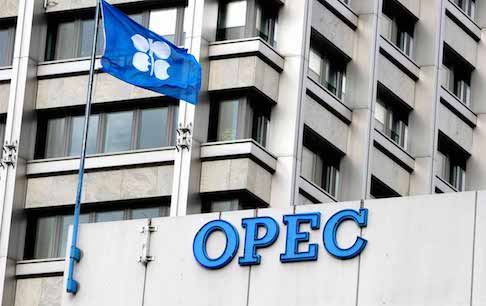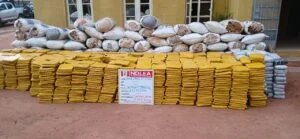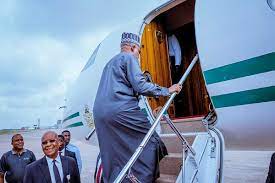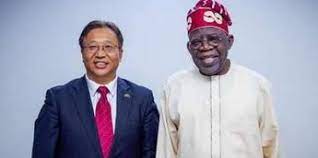Oil & Gas
Saudi Arabia Dramatically Changing Oil Exports to China, US

Ganiyu Obaaro, with Agency report
Saudi Arabia has seriously ramped up its oil exports to China in recent months.
The Saudi Kingdom’s crude shipments to China have doubled in the span of a year. During the same period, its oil exports to the U.S.
have dropped by nearly two-thirds.According to TankerTrackers.
com, which tracks oil tankers and shipments based on satellite imagery and ships’ automatic identification systems, Saudi Arabia exported a whopping 1,802,788 barrels per day (bpd) to China in July, compared to 921,811 bpd in August of 2018. By contrast, exports to the U.S. in July were 262,053 bpd, nearly 62 per cent down from 687,946 bpd in August of last year.U.S. sanctions on Iranian oil have helped the shift. Major Asian energy importers like China have been forced to shift business away from the Islamic Republic -OPEC’s third-largest producer -and start buying more Saudi barrels to make up for that shortfall.
The U.S. is now more self-reliant than ever, thanks to its own Shale oil revolution, which helped it become the world’s largest oil producer by the end of last year.
But the numbers also signal a mix of short-term tactics and long-term strategy for the Saudis, industry experts told CNBC.
“Saudi Arabia learned from the last OPEC production cut in 2017 that they got the biggest bang for their buck by cutting flows to the largest, most transparent and most timely market — the U.S.,” said Matt Smith, director of commodity research at commodities analytics firm ClipperData, referring to the coordinated production cut that OPEC and its allies orchestrated to put a floor under falling oil prices.
“Choking back on flows to the U.S. was the best way to draw down inventories and turn around bearish sentiment, and they are employing the same tactic once again.”
ClipperData’s figures, which differ from that of TankerTrackers due to different tracking methods, still show U.S. imports of Saudi crude in July down over 60 per cent from last October.
Meanwhile, Smith said, as Saudi Arabia “slams on the brakes to the most transparent market, it is sending more crude into the most opaque one, China.”
This is where some industry analysts say Riyadh is employing short-term tactics: “impacting what remains the most visible and closely-watched market indicator, U.S. crude stocks,” Antoine Halff, co-founder of energy market analytics firm Kayrros, told CNBC.
The market has largely traded on weekly U.S. numbers, which — up until the growth of satellite imagery to provide greater transparency on global stocks — provided the best available picture of market conditions.
In spite of the greater availability of global market inventory thanks to satellite data, “the goal of impacting the U.S. stock metric seems to remain very real for OPEC in general and the Kingdom in particular,” Halff said. “Rightly or wrongly, this is the benchmark that everybody watches.”
China, oh the other hand, is not as forthcoming as OECD countries about its stocks, and its data isn’t as visible to the market. Halff notes that there is no established benchmark of Chinese stocks as there is for the U.S.
“Producers are far less concerned about building Chinese stocks than they are about building U.S. or OECD stocks in terms of what that may signal to the market,” he said.
TankerTrackers.com co-founder Samir Madani has described China as a sort of “black hole” for the world’s oil exports, having the ability to “easily absorb oil barrels from the market, especially when prices dip.” Looking at this, many analysts see a clear strategy from Beijing.
“The Chinese are very savvy and astute buyers, exporters who supply them have very good reasons to do so,” Halff said. In the current low oil price climate, the world’s largest oil importer is happy to up its Saudi crude purchases as its appetite increases, particularly given its launch of two new refineries which will grow its refining capacity by 800,000 bpd.
Locking in Asian market share is also a key long-term goal for Riyadh, as it is for other regional producers competing to capture downstream capacity across the continent. Saudi Aramco’s plan to acquire a 20 per cent stake in Indian refining and petrochemicals giant Reliance is the most recent example of this.
Conveniently for the Saudis, there’s also no risk of losing the U.S. as a customer, thanks to its giant Aramco-owned Motiva refinery in Texas. Therefore, “Aramco is willing to increase or decrease to the U.S. based on its own needs,” says Ellen Wald, President of Transversal Consulting and author of the book “Saudi, Inc.”
Business Analysis
A Peep Into Dangote’s Refinery, The World’s Engineering Wonder

By Cletus Akwaya
Call it Dangote Republic and you would not be wrong, for that is what it means in real sense.
The ultra-modern Dangote Refinery and Petrochemical complex located at the Lekki Free Trade Zone in Lagos is the World’s Engineering wonder.
A guided tour for top Media executives in the country by the President, Dangote Industries Group himself, Alhaji Aliko Dangote on July 14, provided a rare privilege and opportunity to appreciate the project that has emerged as the World’s largest single train petroleum refinery.
Dangote, the Kano-born business mogul and Africa’s richest man, whose vision for the industrial transformation of Nigeria led to the initiation of this project is certainly a fulfilled person, having accomplished such a gargantuan task in the spelt of just about 10 years.
The refinery, which is built and equipped with the latest technology in the industry. It is a behemoth sitting on a huge land space of 2, 735 hectares, approximately seven times, the size of Victoria Island, the octane section of Lagos, which has become the abode for the very rich in the nation’s commercial nerve – centre over the decades.
The land was provided by the Lagos state government after the payment of $100million dollars by the Dangote Group as cost of the land.
The edifice didn’t come easy as the engineers had to reclaim 65million cubic metres of sand through dredging of the Atlantic coastline to pave way for the construction of the refinery and its accompanying facilities especially the Jetty.
The Dangote refinery is not a stand-alone project as it has a coterie of associated industries and infrastructure making it a self-reliant complex.
For instance, the company has a fully developed port (jetty)for maritime operations for both in-take of crude and discharge of refined products. This perfectly compliments the huge pipeline network that lands into the Atlantic for intake of crude and loading of refined products to ships. Its Jetty, which stretches 9KM into the international waters in the Atlantic Ocean and 12.5 KM from the refinery is perhaps one of the most modern in the world built with sand piles that shield the final landing points from the violent oceanic waves, thus providing for safety and stability of ships, barges and oil tankers.
The complex is accessed by 200KM network of concrete under-lay and well asphalted road network to ease vehicular traffic. The refinery has its dedicated steam and power generation system with standby units to adequately support operations of the various plants in the complex.
It has successfully completed a 435 MW power generating plant for its operations. The power generated from this plant surpasses the entire distribution capacity of Ibadan Electricity Distribution company, which supplies electricity to five states of the Federation including Oyo, Osun, Ondo, Ekiti and Kwara.
The Dangote refinery with a capacity of 650,000 bpd of crude oil is designed to handle the crude from many of the African countries, the Middle East and the US light crude. Its petrochemical plant is designed to produce 77 different high-performance grades of polypropylene, which is the major raw material for numerous industries and other refineries. With a huge refining capacity, Alhaji Dangote said the products from the refinery company would easily meet 100 per cent the needs of Nigeria’s demand for gasoline, diesel, Petrol and Aviation Jet with 56 per cent surplus for export, from which the company projects to earn a princely $25billion per annum from 2025.
The company has facility to load 2,900 trucks with its various products in a day by land and millions of litres of products through the waters depending on where the orders come from. The $25million projected revenue in 2025 could translate to a huge relieve for the nation in dire need of foreign earnings to shore-up the value of the nation’s currency.
The associated industry, the Dangote Fertilizers Limited also situated in the complex utilises the raw materials from petrochemicals to produce different varieties of fertilzers especially Urea, NPK and Amonia grades of fertilizers. Apart from the local market, Dangote is already exporting its fertilizers to other countries including Mexico, a testament to its high quality that meets world standards.
This feta, the President of Dangote industries explained was possible because of the high quality, the company has opted to pursue. In between the refinery and the fertilizers complex lies a 50,000 housing estate, which provided accommodation for the construction workers at the time of construction especially during the COVID-19 lockdowns of 2020, when workers remained encamped on the project site to continue with the work.
What stands out the Dangote Refinery is perhaps not in its sheer size and capacity but in the fact that it is perhaps the only of such projects whose Engineering, Procurement and construction(EPC) was done directly by the company without engaging the world renowned refinery constriction companies like Technip Bechtel (USA)Technip (France)Aker Solutions (Norway)Chiyoda Corporation (Japan)SNC-Lavalin Group (Canada)J. Ray McDermott (USA)JGC Corporation (Japan)Hyundai Heavy Industries (South Korea)Foster Wheeler (USA) and Daelim Industrial Company (South Korea)
“The design of the refinery was handled by dozens of Engineers and technical experts assembled in India and Houston, Texas, USA to execute engineering designs of the refinery,” said Edwin Kumar, the Executive vice President, Oil and Gas for the Dangote Group who midwifed the birth of the refinery complex.
“We didn’t give out contracts to anybody, we bought every single bolt and equipment ourselves and had it shipped into the country,” Dangote explained to his guests.
Part of the equipment imported into the country was the procurement of over 3,000 cranes to handle the evacuation of huge consignments of machinery from the wharf and for subsequent installation at the construction site. The cranes have become an unusual assemblage of such equipment to be found in one place on the African continent.
If there was any doubt that Alhaji Aliko Dangote is Africa’s richest man, the successful completion of the refinery and petrochemical complex at the cost of about $20billion has further confirmed his status as Africa’s leading businessman and entrepreneur.
However, Dangote does not really accept that he is the richest man on the continent,
“When you are rich, you accumulate cash, but when you wealthy, you create wealth” he told the top Media executives on tour of the huge project, explaining that he would rather prefer to be referred to as a “Wealthy man.”
And consistent with his business philosophy, Dangote hinted of plans to list the refinery on the Nation’s stock exchange by the first quarter of 2025. His vision is to avail the public of 20 per cent of the shares so as to ensure participation by Nigerians and even international portfolio investors.
The refinery company and the entire of Dangote Group at the moment provides direct employment to about 20,000 Nigerians and much indirect jobs to Nigerians, making it the highest employer of labour outside the government.
Most interestingly, the highly technical operations of Dangote refinery is operated by over 70 per cent of local manpower who work in the refinery control, centre, the numerous production and quality control laboratories among others. Some of the staff who explained their tasks to the visiting media executives said they were graduates of Engineering and allied disciplines recruited mostly from Nigerian universities and trained in various institutions abroad for periods ranging from sixth months – one year to master refinery operations. Through this strategy, Dangote has ensured transfer of technology to thousands of Nigerian youths.
“We don’t know where they come from as long as they are Nigerians and if they decide to leave and join international oil companies for better job opportunities, we have no problem with that,” Dangote responded to a question on the strategy to retain the technical manpower for stability of the refinery’s operations.
The Dangote Refinery is a Republic of some kind, at least an economic or industrial Republic.
But the man who presides over this ‘industrial empire’, Alhaji Dangote says his only ambition is to boot the nation’s economy and ensure netter life for Nigerians.
“When you import any product into Nigeria, you are importing poverty and exporting our jobs to those countries from where you are importing” Dangote said adding “this is why I want economic nationalism in Nigeria.”
Dangote’s vision even goes beyond Nigeria as he has cement factories and other business concerns in about 13 African countries including Ghana, Ethiopia, Tanzania, Uganda, etc. This signifies his continent-wide dream to transform Africa’s economies.
There has been attempts by some international oil companies to frustrate the successful take-off of the refinery, through over pricing and in some instances outright denial of crude supplies for processing. This made Dangote to commence importation of crude from the US. However, the cheering news that the Nigerian National Petroleum Company Limited (NNPC) has finally approved a supply arrangement has raised hopes that full operations will commence and that the long-awaited Dangote oil products will reach consumers around the country from August.
At last, the Dangote Group may have achieved its objective to serve as the elixir to Nigeria’s industrialisation effort. This is perhaps the greatest legacy of Africa’s richest man to his country of birth.
COVER
Dangote Industries Ltd. Confirms Minor Fire Outbreak at its Refinery

Dangote Industries Ltd. has confirmed a minor fire incident at its Effluent Treatment Plant (ETP) in Lagos on Wednesday and which was swiftly contained.
The Group Head of Corporate Communications at Dangote Group, Anthony Chiejina, disclosed this in a statement in Lagos.
Chiejina said: “There is no cause for alarm as the refinery is operating and there is no recorded injury or harm to any of our staff on duty.
”He said that emergency services responded on time to contain the incident.
Although initial reports said no injuries were sustained.
According to him, the cause of the fire is currently unknown, and investigations are underway to determine the extent of the damage and the cause of the incident.
The Dangote Refinery is a massive project with a projected refining capacity of 650,000 barrels per day.
NEWS
NSCDC Uncovers Illegal Bunkering Sites in Rivers Cemeteries

The Nigeria Security and Civil Defence Corps has busted illegal crude oil refining sites at cemeteries in Abalama and Oproama Communities in Asari-Toru Local Government Area of Rivers State.
The security outfit said the feat was achieved by its Marine Anti-vandal Squad after a four hour operational tour on water across the two coastal communities.
Speaking to newsmen after the operation, the NSCDC spokesman, Rivers State Command, Superintendent Olufemi Ayodele, said its operatives successfully uncovered the illegal bunkering sites through credible and sustained intelligence.
Ayodele recalled that the NSCDC Commandant General, Dr Ahmed Abubakar Audi, gave a marching order to all formations in the Niger Delta to step up intelligence and operational efficiency in the fight against oil theft and illegal oil bunkering activities.
He expressed worry about how the miscreants devised a new means of converting cemeteries to illegal bunkering sites, saying they had already loaded several illegally refined crude and refined Automotive Gas Oil also known as diesel was sighted in boats by the riverside.
The state NSCDC image maker however said on sighting its operatives the hoodlums took to their heels though they were giving a hot chase, pointing out that men of the Marine Anti-Vandal Squad are on their trail to ensure they are arrested and prosecuted.
He stated, “Acting on this directive the Rivers State Commandant of the NSCDC, Basil Igwebueze, deployed the Marine Anti-vandal Squad to the crime scene where several boats filled with crude oil and refined Automotive Gas Oil were sighted.
‘This is the Abalama community and behind us is the Oproama community as well where Cemeteries were converted to illegal bunkering sites; Upon our arrival, the suspects took to their heels knowing the squad had superior firepower.
‘The NSCDC as an environmentally friendly agency condemns outright all acts of environmental pollution, degradation of aquatic life and economic sabotage.
“We have contacted some good people in the two communities and they are cooperating with us so that the perpetrators would be apprehended in due course. However, the quantities in litres of the locally refined AGO cannot be ascertained.”
He added, “Consequently, the NSCDC Rivers State Command helmsman has further issued a stern warning against the activities of vandals and illegal bunkers in the state affirming that the fight against oil theft is a relentless war and suspects arrested with their sponsors would be made to face the full wrath of the law.”



























